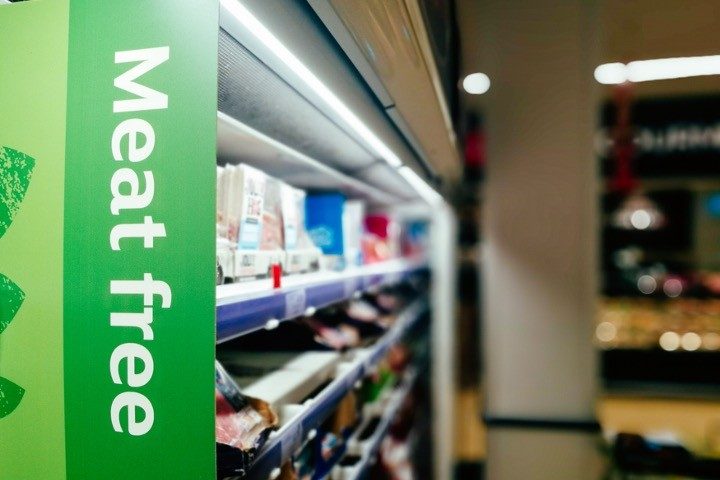
The Left and the global elites have long demonized eating meat, and accordingly have pushed fake, plant-based “meats.” But is the entire vegan house of cards on the verge of toppling over?
In a major blow to the industry, Impossible Foods, one of the most well-known manufacturers of meat alternatives, recently announced that it will be cutting 20 percent of its workforce. As Bloomberg reports, the Redwood, California-based company employs around 700 people, meaning the latest round of cuts would eliminate at least 140 jobs.
This marks the company’s third wave of layoffs within the last year. The most recent was in October, when it cut six percent of its workforce.
Impossible Foods has made a name for itself thanks to partnerships with a number of big-name brands and restaurants. Its products can be found at chains like Burger King (which sells an Impossible Whopper), White Castle, and Qdoba.
The company has tried to make it seem like there’s no trouble in paradise. It recently claimed that its sales were up more than 50 percent in 2022, and in September, CEO Peter McGuinness maintained that Impossible Foods has a strong balance sheet. In the face of the job cuts, the company wants the public to believe that it’s simply streamlining itself to promote better growth.
But statistics for the plant-based meat market don’t inspire optimism. According to the research firm IRI, sales of meat alternatives dropped 15 percent by volume for the 52 weeks ending January 1.
There’s also data from HundredX, which states there has been a growth in the number of consumers who say they have eaten Impossible products but who are less likely to eat as much in the future.
And a 2021 survey of Australian men conducted by pro-fake-meat group Herculean Strength suggests that more than 70 percent of the participants would rather die 10 years earlier than forsake meat eating.
Part of the problem for the industry has been the connotation of wokeism surrounding fake meat. An example of this cited by Bloomberg was the intense customer backlash that erupted over the summer when Cracker Barrel announced its plans to add Impossible Foods’ sausage as a menu option.
The woes for Impossible Foods come even as the company has gone to great lengths to keep consumers interested, such as buying an entire full-page ad in The New York Times to push back against the notion that meat alternatives are merely a fad.
But it isn’t only Impossible Foods that’s flailing in the water. Other fake-meat companies now find themselves in a similar predicament.
As Bloomberg notes, Beyond Meat Inc., a major competitor to Impossible Foods, also recently found itself forced to slash 20 percent of its workforce — amounting to about 200 jobs.
The company has suffered from a string of setbacks. For one, McDonald’s chose to discontinue its much-hyped “McPlant” burger. And in November, Beyond made headlines when photos emerged showing mold in and near its food-production and storage equipment.
There were also documents showing that their products had tested positive for the harmful bacteria listeria. This forced the company to publish a statement assuring the public that they go “above and beyond industry and regulatory standards” and that they are “in good standing with Pennsylvania’s Department of Agriculture.”
Of course, it didn’t help that Beyond Meat’s COO brought the company bad press when he was arrested for biting a man’s nose in a parking lot and making a death threat after a football game.
Despite the fact that consumers are demonstrating they simply aren’t interested in replacing meat with these plant-based alternatives, the powers-that-be continue to push it, and now even some of the top names in meat production are breaking into the fake-meat industry.
As a recent piece at The National Pulse details:
The world’s largest meat-producing corporations, like JBS and Tyson, are aggressively pushing into the new “ownership envelopes” of fake food by restructuring themselves and acquiring salmon-aquaculture farms, pea-protein companies and insect farms. These mega-players are rebranding themselves not as purveyors of particular foodstuffs – meat or dairy – but instead as purveyors of the most desirable macronutrient of them all, protein. Tyson, for instance, has already trademarked the term “the Protein Company”. In a real sense, like the banks in 2007, the fake food sector is on the verge of becoming “too big to fail”, if it hasn’t already acquired that status.
And plant-based products aren’t the only meat alternatives that the globalist elites would have us eating. An article on the World Economic Forum’s website promotes the eating of weeds.
“Finding new plant-based foods is becoming increasingly urgent with the world’s population forecast to grow by two billion in the next 30 years. While farming animals for meat generates 14.5 percent of total global greenhouse emissions, weeds capture carbon from the atmosphere and can therefore help to control climate change,” wrote contributor Douglas Broom.
Another article suggests humans can be conditioned to eat and even enjoy such things as insects and grubs.
And if the people won’t be persuaded to abandon meat peacefully, then they’ll have to be forced into it. In Europe, climate alarmists are calling for the government to make meat more expensive by placing taxes on it, arguing that livestock farming is responsible for up to 13 percent of all greenhouse-gas emissions.
Ultimately, the goal is to have the people weakened and debilitated by feeding them highly processed, artificial “foods.” In this way, the world’s populace will be much easier for the globalists at the World Economic Forum to control.




